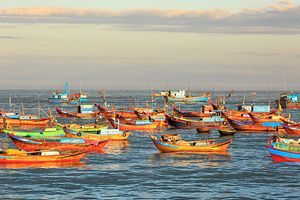On May 1, residents of Ho Chi Minh City, still commonly referred to as Saigon, were waking up after marking the 41st anniversary of the reunification of Vietnam. Fireworks the previous night gloriously celebrated the victory of a steadfast army of communist North Vietnamese over the crumbling government of South Vietnam and the Americans following two decades of unsuccessful military involvement. Having left that ugly mess behind, many Vietnamese were hopeful this year’s changes in leadership would usher in a new era of good governance.
Other Vietnamese woke up on this traditional Labor Day, or International Workers’ Day, energized to take to the streets in protest, turning out in their hundreds in Hanoi and thousands in Ho Chi Minh City. They were marching in protest over reports that tons of fish started turning up dead along the country’s coastline in early April, along the shores of the four central provinces of Ha Tinh, Quang Binh, Quang Tri and Thua Thien-Hue. Videos featured on Facebook and YouTube showed several protesters being beaten and driven away by vehicles in Ho Chi Minh City.
Many of the protesters were angry – convinced the dead fish were the result of wastewater discharged from the nearby $10.6 billion coastal steel plant owned by a subsidiary of the Taiwanese conglomerate Formosa Plastics Corporation. The management of Formosa recently admitted to operating a mile-long, illegal sewage pipe going straight into the sea – though they claimed the discharged wastewater is treated. A spokesperson for the company was also reportedly punished for his inept response to the accusation, arguing that the Vietnamese people had to choose between jobs and a clean environment, claiming “You want the fish or the steel plant? You have to choose.”
How the new Vietnamese leadership responds to their first real domestic challenge will be telling. Following the apology last week of Vietnam’s minister of environment and natural resources, Tran Hong Ha, for putting forth a “confused” response to the crisis, Vietnam’s new leadership appears to be taking constructive steps. Vietnamese Prime Minister Nguyen Xuan Phuc has advised investigative authorities, “We will not shield anyone found causing the pollution,” a ban was placed on the sale and distribution of dead aquatic products from the central region, financial assistance and rice is being offered to fishermen facing a loss of revenue, and through quality control monitoring, fish sales have again resumed. Discussions with Formosa management are being held, monitoring of further discharge from the steel plant is underway, and the government is turning to outside environmental consultants from the United States, Germany and Israel to join a national panel of 100 scientists to help determine the cause of the disaster. And, unlike in many countries, much of the bad news is circulating on social media platforms such as Facebook, which has about 30 million users in Vietnam.
Yet the new leadership is drawing strong criticism online after their response to recent demonstrations in Hanoi and Ho Chi Minh City last weekend. When the demonstrations threatened to spiral out of control, several protesters were roughed up by uniformed and plainclothes police and hauled away in buses and unmarked cars in both cities. The detainments came the day before Tom Malinowski, U.S. assistant secretary of state for democracy, human rights and labor, was scheduled to arrive in Vietnam. During his two-day visit, Malinowski is expected to monitor progress on human rights and call on Vietnamese leadership unconditionally release political prisoners – the latest detainments should be high on his agenda.
While many Vietnamese have taken to the streets in peaceful protest, others have organized a White House petition asking the U.S. government to investigate the cause of the fish deaths, which has 138,000 signatures so far, and comes ahead of U.S. President Barack Obama’s visit later this month to Vietnam. Others have led a petition on Change.org for international media to cover the crisis, which has seen scant coverage so far.
In response to the protests, the new Vietnamese leadership has bought some time by announcing the involvement of outside experts, but the government will need to tread carefully. Vietnamese citizens are becoming worried, consuming river fish instead of ocean fish, and many are become increasingly aware of their environment. In March 2015, citizens in Hanoi staged a citywide protest against the local government’s arbitrary decision to chop down hundreds of trees without consulting either the public or experts.
The biggest fear for Vietnam’s new leadership is that the environmental disaster could morph into heightened nationalistic tensions if the Formosa factory is found guilty. In May 2014, the same steel mill came under attack by rioters following the deployment of a Chinese offshore oil drilling rig into Vietnam’s exclusive economic zone (EEZ). A mob set upon the mill, with reports of fatalities.
The trick for the new leadership will be to monitor and manage public opinion and outrage, through greater transparency and effective outcomes. Last Saturday, Vietnam’s environment ministry announced around 100 foreign and Vietnamese experts completed a thorough inspection of Formosa. The new leadership will need to announce the results soon, punish those responsible, and put forth a credible plan for future environmental disasters – or we could see another challenge to their leadership with another round of nationwide protests, or worse, next Sunday.
Gary Sands is a Senior Analyst at Wikistrat, a crowdsourced consultancy, and a Director at Highway West Capital Advisors, a venture capital, project finance and political risk advisory, currently based in Ho Chi Minh City, Vietnam. Twitter@ForeignDevil666.

































